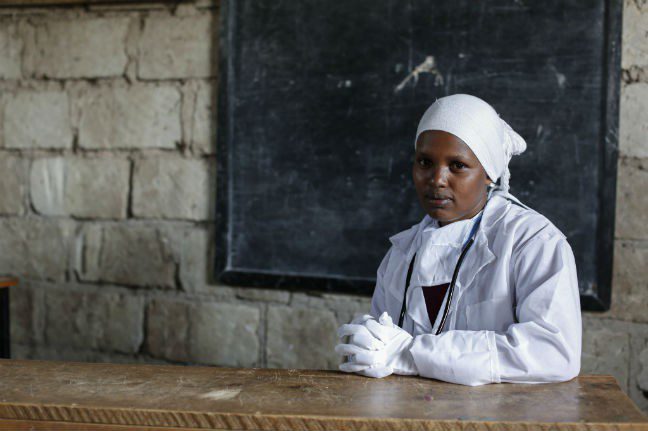On her way to school, Yusra negotiates the toxic human waste that lines the streets. The sanitation crisis in her home — the Mukuru slum in Kenya — means residents are forced to use pit latrines and plastic bags as their toilet. These plastic bags litter the streets, the pit latrines spill into homes and the threat of disease lingers everywhere.
For the children of Mukuru under the age of five, their lives hang in the balance. Without access to proper sanitation and good hygiene, preventable disease like diarrhea and cholera can take their lives. In fact, the loss of life for children and young people in Mukuru is so extraordinary that the average life expectancy has been lowered to just 40 years old.
Yusra’s own brother died from a disease when he was just five years old. Now, 14-year-old Yusra wants to be part of the solution.
“I want to be a mother some day but not now,” said Yusra.
“I want to be a doctor to help people when I go back to my village. Some people in my village don’t go to the hospital, they just use shops to buy medicines and they don’t know what they’re suffering from. If I was a doctor I would be able to see what was wrong … ”
But a lack of sanitation means children like Yusra may never realise their ambition. The constant plague of sickness impacts on school attendance. It’s a profound loss; without a proper education, Yusra may never be able to lift herself out of poverty.
The implications of poor sanitation for young women and girls are particularly complex. The filthy pit latrines are the only ‘accessible toilet’ and are especially uncomfortable for women. Often, they present a new form of danger.
“It’s dangerous to use the pit latrines here, because you can get a disease like cholera. If you’re a girl and you have your period, you can’t change your pads … sometimes the girls put their sanitary towels everywhere. Even if you felt like you were going to vomit, you still had to go back to use the toilet,” said Yusra.
“It’s dangerous to use the pit latrines here, because you can get a disease like cholera. If you’re a girl and you have your period, you can’t change your pads …
Yusra’s mother, Hawa, explains the lack of sanitary items can also impact her daughter’s education.
“When Yusra has her period I normally try to buy some sanitary pads for her so at least she can go to school, but for me, I don’t need to go anywhere so I just stay back at home,” said Hawa.
“But at times when I don’t have money [for pads], Yusra has to stay at home [so misses school].”
Both Yusra and her mother worry about safety in Mukuru, where after dark, gangs make walking five minutes to the local pit latrine too dangerous to attempt.
“We make sure that we go to the toilet early, before it gets dark. Because when it gets dark we cannot go to the toilet. We fear for our lives, especially on the narrow stretch that we use to get to our place from the main road,’ said Hawa.
Fortunately, things have changed for Yusra and her classmates since the introduction of Fresh Life toilets into her school. Rueben Primary School is one of 10 pioneer schools to receive and reap the benefits of clean, safe toilets.
“Before the Fresh Life toilet at school there were faeces everywhere, and nowhere to wash,” said Yusra.
“In Fresh Life toilets they have a place where you can put your pads. It’s simple and good … for girls, when you are going to the toilet in the plots with no security, you are afraid as someone can come and attack you or rape you. Many of the pit latrines have no locks. There is just a nail to close to the door — but the Fresh Life toilets have a lock.”
It’s no surprise then, that school attendance has skyrocketed since the introduction of Fresh Life toilets — especially for young women and girls. Some schools have recorded an increase of nearly 50%, with more students arriving every day.
The changes are incredible, and you can watch them for yourself.
Sanitation and good hygiene may be a complicated issue, but the solution is clear. Good health saves lives. Good health means a good education. And a good education means a chance to escape poverty. By keeping kids safe from disease, you’ll help save lives now and in the future.
You can help save lives, give the gift of health, and secure a child’s future.

